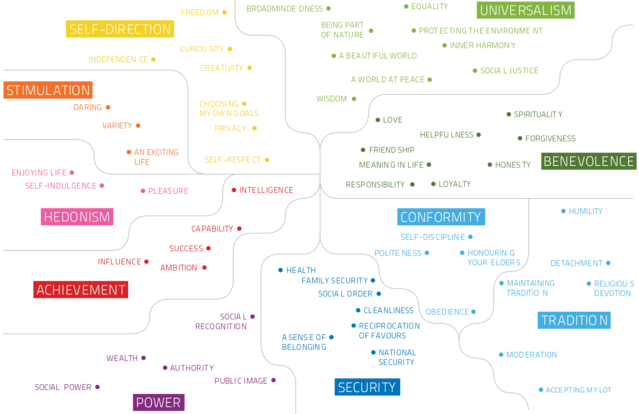Conformity
One Easy Change in Perspective Can Deepen Your Understanding
This simple tip, involving common human values, brings empowering benefits.
Posted August 4, 2022 Reviewed by Vanessa Lancaster
Key points
- Focusing on shared values is an empowering way to build understanding, which isn’t the same as an agreement.
- Each of us holds values that are in tension with each other. These values are expressed differently but are common to almost everyone.
- Reflecting on our inner contradictions is a powerful way to stop overestimating how different we are from those we disagree with.
You know who you are and what you stand for. And sometimes, that’s just miles away from what your partner, co-workers, or family members stand for or care about. Or is it? One simple tool will help you find out. And this knowledge might surprise you.
Let’s say that you’re a proud individualist. What you like more than anything is the freedom to make your own choices. You frequently have strong disagreements with your sister, who doesn’t care about choices and does what she’s told by her boss, doctors, and your parents. This different orientation to life seems destined to lead you to continued bitter conflicts. But rather than focus on the difference, what if you tried thinking about how you actually share values?

The social psychologist Shalom Schwartz developed this theory of 10 basic human values. People in the many countries where it’s been studied seem to hold these values. That’s already intriguing. More incredible still is that you likely have most or all of these values in common with folks you seem very different.
This realization is massive when you’re in a difficult conversation and can’t get where the other person is coming from. Maybe you could understand if you considered other values.
In the example above, you highly value what Schwartz called self-direction, while your sister highly values conformity. But the truth is, you also value conformity. You wear the right clothes to a date or job interview, and you much prefer people who are polite over ones who are rude. Those are all preferences for conformity.
In your day-to-day decisions, you work out the tensions between your self-direction values and your conformity values so readily that you don’t even notice that you value many types of conformity. You thought of yourself as 100 percent self-direction. But it’s not that simple. You can likely also find examples of your sister valuing self-direction (privacy, creativity) in some cases too.
Reflecting on Inconsistencies Can Be Rewarding
Reflecting on your inconsistencies, the fact that you’re never purely one way or another can be rewarding. Are you the same person at work and with close friends on your own time? These two versions of you likely have certain conflicting aspects. Recalling our tendencies to behave in conflicting ways and how much we change depending on the situation helps us reduce the imagined distance between ourselves and others.
And there are plenty of contradictions most of us can reflect on. Perhaps you value success and intelligence (achievement) but also think it’s important to be humble (tradition). You want some social recognition and status (power) but also value treating people equally (universalism). You want excitement and variety in your life (stimulation) and a stable and predictable society (security).
Seeing these tensions and contradictions can enrich your understanding of yourself and other people. Understanding someone doesn’t mean agreeing with them; it just means you’re empowered with a better sense of the situation. You still need skills to navigate any given conflict with your sister.

But now you realize that you’re both likely to hold all 10 values, just in differing degrees. You can see that there’s no longer such a big divide between your decisions and your sister’s. You stop over-estimating the distance between you and stop thinking of her as morally inferior.
Try this out for yourself. Pick a belief or behavior from a friend or family member that you find odd or challenging. Now try to place it within these 10 common human values. What value seems most important to this behavior or belief? Don’t lay out the evidence for or against it being reasonable or moral. Don’t diagnose it. Just think about what value it comes from.
I’ve facilitated workshops for hundreds of people who’ve done this exercise. They pair up with strangers they disagree with. The pairs don’t discuss why they disagree. Participants don’t argue about why they’re right and the other person is wrong. They discuss what values led them to their position on a controversial issue.
Folks doing this are regularly surprised. They soon discover some common ground through putting reasons for their beliefs aside and just talking about values. That doesn’t mean they change their minds or come to think like each other. (Thinking alike isn’t always a good thing to strive for.) It just means they understand how the other person got to their (opposing) position. This understanding helps in not feeling negative about that person as a person.
What’s even more startling, and happens in some cases, is participants realizing that they’re expressing the same value—and it’s led them to opposite beliefs or behaviors.




